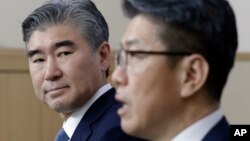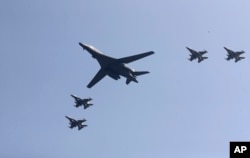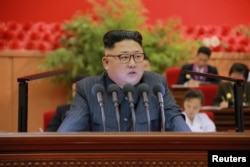In South Korea Tuesday two American B-1 bombers flew in from Guam as a show of force, while on the ground U.S. and South Korean diplomats met to coordinate strategies to respond to North Korea's fifth nuclear test, conducted Friday.
The U.S. long-range bombers conducted a low-altitude flight over Osan Air Base in South Korea, which is 77 kilometers from the Demilitarized Zone border with the North.
The B-1 deployment was scheduled to arrive Monday but was delayed due to bad weather in Guam.
Sanctions
It appears that the long term reaction by the U.S. and its allies to North Korea's fifth nuclear test last Friday is going to be economic in nature.
At a press conference in Seoul U.S. Special Representative for North Korean policy, Sung Kim, and South Korea's Special Representative for Korean Peninsula Peace and Security Affairs, Kim Hong-kyun stressed their countries' joint commitment to impose even greater economic pain on the Kim Jong Un government.
“South Korea and the U.S. decided to have strong sanctions and pressure measures at maximum level, and strengthen measures against North Korea including the U.N. Security Council measure, independent sanctions and pressure at global level,” said the South Korean envoy Kim Hong-kyun.
North Korea reacted defiantly to the United Nations sanctions imposed in March for its fourth nuclear test. In the last six months Pyongyang has accelerated its weapons development efforts, conducted 20 missiles tests and last week detonated an unprecedented second nuclear test in one year.
Despite the sanctions’ failure in the short term to change Pyongyang’s behavior, the U.S. envoy said they have been effective in curbing North Korea’s access to foreign currency to support its weapons program.
“I think it’s important to remember that pressure and sanctions need time. It requires sustained concerted effort, systematic effort to really have the kind of effect we desire,” said Sung Kim.
China
On Monday the U.S. Treasury Secretary Jack Lew said coordinated economic sanctions had been shown to work but added China's participation was very important.
North Korea is economically dependent on China for trade and assistance.
Both China and Russia supported the U.N. sanctions imposed in March but both seem reluctant to back increased punitive measures this time.
Chinese Foreign Minister Wang Yi met with Russian Foreign Minister Sergei Lavrov Monday and afterwards urged all relevant parties to remain calm and exercise restraint.
There are also indications that both Beijing and Moscow may push for unconditional international talks to offer Pyongyang incentives to give up its nuclear weapons.
The U.S. and its allies have insisted that North Korea first take steps to halt its nuclear development activities before entering into new talks.
The U.S. envoy said Washington has repeatedly expressed a willingness and flexibility to engage in dialogue but Pyongyang is not interested.
“If the North Koreans are ready talk to us sincerely about denuclearization I think we can work with that,” said Kim Sung.
In 2005 during six party talks involving North Korea, South Korea, the United States, China, Russia and Japan, Pyongyang agreed to dismantle its nuclear weapons program in exchange for economic aid, security guarantees and improved diplomatic ties.
But Pyongyang failed to live up to its commitment and conducted repeated nuclear tests in the years that followed. The U.N. has responded by imposing increasing rounds of sanctions on North Korea.
The envoys emphasized that China and Russia both have condemned North Korea’s nuclear activities.
Sung Kim said China in particular understands the need for a new Security Council resolution in response to the latest nuclear test.
The American and South Korean envoys also said there is no need to either deploy U.S. tactical nuclear weapons on the Korean peninsula or for South Korea to develop its own nuclear program to deter the North Korean nuclear threat.
“Our government will maintain and strengthen its strong deterrence capability against North Korea's nuclear and missile threats through the strong defense posture of ROK (Republic of Korea) and the U.S., and extended deterrence,” said Kim Hong-kyun.
The U.S. is committed to defend its allies South Korea and Japan in East Asia against a nuclear attack by another country.
Youmi Kim contributed to this report.







